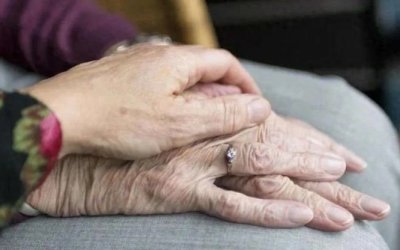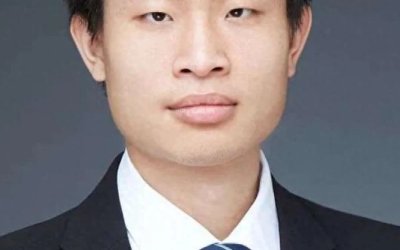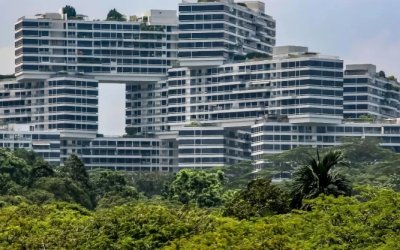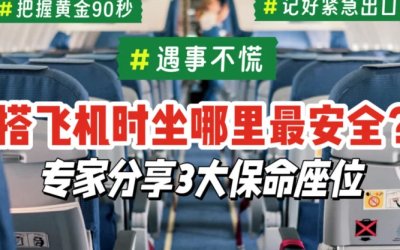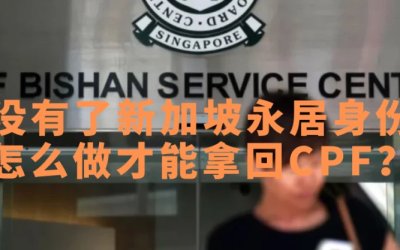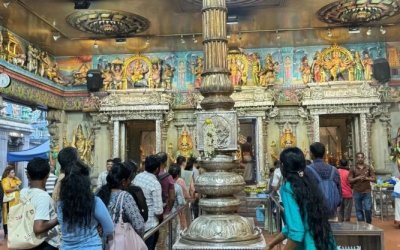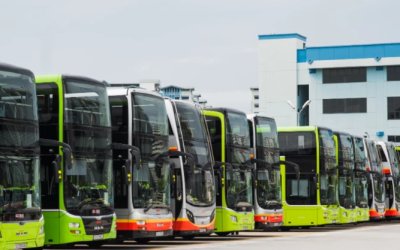The team provided a structured environment with routines, made efforts to understand how Lek Wei received instructions and gave him time and space when he was overwhelmed. He picked up skills like weighing ingredients and rolling dough and found joy in making delicious bread for others.
3.30 pm
Gradually, Lek Wei could regulate his emotions better and made such good progress that he secured a job trial at Boon Café @ ITE College Central. During this trial period, the Sheltered Workshop and Job Coaches guided Boon Café in job redesigning. For example, Boon Café personalised Lek Wei's workstation by labelling the ingredients and colour coding the steps to his recipes. The Café employees also learned how to communicate with him. They speak to him slowly, with simple words. Through all these efforts, Lek Wei assimilated well and a few months later, Boon Café offered Lek Wei full-time employment. Lek Wei was Boon Cafe's first employee with disability and he opened the door for the hiring of three more at the cafe. I also tasted some of the pastry that he made, I must say they were "yummilicious".
Mr Ong Hua Han will be interested to know that our Sheltered Workshops provide a structured learning and training environment, with support from allied health professionals and training officers. As shown through Lek Wei, such environments enable those with higher needs to learn and develop at their own pace and hopefully, eventually enter open employment.
As demand for Sheltered Workshop spaces remain high, we will increase capacity by 500 spaces, from the current 1,700 to 2,200 by 2030. We will add 100 spaces to APSN's Centre for Adults this year, with the rest added progressively over the next few years. Because of the good uptake of the range of work opportunities, we raised the employment rate of resident persons with disabilities aged 15 to 64 from about 28% in 2018 to 2019, to 33% in 2022 to 2023, and we will press on towards our aspirational employment target of 40% by 2030.
I am heartened, as Ms Carrie Tan and Ms Ng Ling Ling would be too, that more employers like Boon Café are hiring inclusively. These employers are accredited with the Enabling Mark. Based on the Comprehensive Labour Force Survey for 2022 and 2023, close to half of persons with disabilities were employed in community, social and personal services, manufacturing and F&B services. To expand the jobs available, SG Enable is reaching out to employers in emerging sectors, such as transport and storage, including logistics; and financial and insurance services. We call upon more employers to be inclusive hirers, so that more people like Lek Wei can pursue their work aspirations.
Beyond employers, the community plays a key role in enabling our persons with disabilities to live independently and feel valued. In the Enabling Masterplan, we committed to provide a continuum of support services that enable persons with disabilities to live in the community.
For those unable to work, our Day Activity Centres (DACs) help to equip them with essential daily and community living skills. We will add 500 DAC spaces, from the current 1,800 to 2,300 by 2030. We will add 50 spaces to the MINDS Jurong Training and Development Centre by 2025, with the rest added progressively in the next few years.
SG Enable launched the first Enabling Services Hub (ESH) in Tampines last August. The ESH complements current support services by bringing services and programmes closer to homes of persons with disabilities. Through working with community partners, we hope to create inclusive neighbourhoods and strengthen support for adults with disabilities and their caregivers, especially for those no longer actively receiving services.
Take Irfan and his mother Madam Sheriffa whom I met recently as well, for example. Irfan was not suitable for work after graduation and was staying at home. Thankfully, Sheriffa was connected to the ESH, which engaged Irfan in various activities close to where they stayed. One activity Irfan enjoys is volunteer book-shelving at the Tampines Regional Library. He volunteers every Thursday. So every Wednesday night, he hangs up his blue volunteer t-shirt, looking forward to volunteering the very next day. Irfan also enjoys community fitness activities at Tampines West Community Club, including inclusive floorball activities. These activities have brought Irfan out of isolation and into the community.
Madam Sheriffa works night shifts at a fast-food restaurant and takes care of Irfan in the day. Irfan's engagement in activities allows Sheriffa to run errands or to have a much-needed respite before work. Sherrifa has also made friends with fellow caregivers through ESH activities and knows she is not alone. To date, the first ESH has supported more than 140 persons with disabilities and caregivers living in Tampines and Bedok. Riding on this encouraging progress, we will launch the second and third ESH in 2025 – one in the North-East covering Punggol, Hougang, Sengkang and Serangoon; and one in the West focusing on Jurong West.
We hope that the ESHs will support more persons with disabilities like Irfan and very importantly, provide respite for caregivers like Sheriffa too. I agree wholeheartedly with Mr Ong Hua Han that we need to support our caregivers, who play an indispensable role. In fact, it is also a point that I made in my speech in the debate on the Budget statement just a week ago. CaringSG will collaborate with the ESH and other communities to strengthen community and peer support.
To support persons with disabilities and their caregivers with long-term financial and care planning, more than 1,200 trust accounts have been set up with the Special Needs Trust Company (SNTC). We share Mr Murali Pillai's hope that more families will set up trust accounts and tap on the Special Needs Saving Scheme (SNSS) to set aside CPF savings for long-term care. SNTC works with key partners, including SG Enable, SPED schools and Social Service Agencies to reach out to families.
The Government is also strengthening support on caregiving costs. For those who require point-to-point transport to commute to SPED schools and community-based programmes, we will increase the Enabling Transport Subsidy (ETS) from 1 April 2024 to alleviate the cost of transport services. Currently, about 5,400 beneficiaries are receiving the ETS. With this increase, about 40% of families currently receiving the ETS can expect a reduction in their out-of-pocket transport fees by 10% or more.
Also, Deputy Prime Minister Wong announced that we will update the per capita household income threshold for means-tested subsidies so that more families can benefit from subsidies like the ETS. Valid means-test results can also be shared across schemes, so that beneficiaries need not undergo repeated means-testing within a period of time. This will help ensure that our schemes and subsidies remain accessible to those who need them.
Lastly, the Enabling Masterplan commits to improving accessibility and inclusiveness in our social and physical environments. We have extensively improved the accessibility of our public transport and public spaces; all public buses and train stations and almost all public sector buildings are wheelchair-accessible.
You and I can play our part through small but impactful actions, such as looking out for those who need a hand, smiling more, staring less at unusual behaviour and focusing on their abilities and not limitations; because together, we can build a caring and inclusive society. Chair, in Mandarin, please.


